Topic
Format

Loan Agency
Trends in Loan Agency and Regulatory Compliance

Deal Terms Analysis
2025 M&A Deal Terms Study

Loan Agency
The Contest for Capital: Private Credit vs Broadly Syndicated Loans 2024

Shareholder Representation
M&A Earnout Provisions – What You Need to Know

Loan Agency
Five Considerations When Engaging an Administrative or Facility Agent

Shareholder Representation
M&A Tax: Key Considerations for Mergers & Acquisitions in 2025

Tools for Practitioners
SRS Acquiom Barometer: 2025 M&A Outlook

Deal Terms Analysis
2025 Working Capital Purchase Price Adjustment Study

Deal Terms Analysis
Life Sciences
Bio/Pharma M&A: Earnout Achievement Insights

Deal Terms Analysis
M&A Deal Terms: Three Trends to Watch in 2025

Loan Agency
Lack of Supply, Competition Leads to Tighter Spreads

Deal Terms Analysis
2024 Trends in M&A Indemnification Claims and Earnouts

Deal Terms Analysis
Lower Middle Market M&A Deals: What Makes Them Different?

Indemnification
M&A Escrows: What You Need to Know

Deal Terms Analysis
2024 M&A Deal Terms Special Report: Lower Middle-Market Deals

Loan Agency
Deflated Default Rate May Not Tell the Whole Story

Shareholder Representation
Payments
Joinder Agreements and Contribution Agreements in M&A

Payments
Shareholder Representation
Pro-Rata Shares: The Dos and Don’ts in M&A Transactions

Indemnification
Payments
How to Avoid Complications with M&A Escrows and Payments

Loan Agency
Peaceful Coexistence: Evolving Private Credit Market Shows Similarities to BSL Market

Loan Agency
Liability Management Transactions are Poised to Proliferate: What You Need to Know

Loan Agency
Uptiering: Steps Lenders Can Take Against Predatory Practices

Shareholder Representation
Delaware Case Law Update: New Statutory Provision for Appointing the Shareholder Representative in M&A Transactions

Deal Terms Analysis
2024 M&A Claims Insights Report

Loan Agency
Predatory Uptiering: Three Steps to Protect Against Being Primed

Due Diligence
M&A Advisors: Prepare for the Modern Due Diligence Process

Tools for Practitioners
SRS Acquiom Barometer: 2024 M&A Mid-Year Outlook

Indemnification
M&A Escrows Checklist: Avoiding Common Pitfalls

Indemnification
Deal Terms Analysis
2024 RWI Highlights: Effect of Reps and Warranties Insurance on M&A Deal Terms

Deal Terms Analysis
2024 M&A Deal Terms: Highlights for M&A Advisors

Shareholder Representation
M&A Checklist: Engaging a Professional Shareholder Representative

Due Diligence
5 Reasons an M&A Virtual Data Room Beats File-sharing Services

Due Diligence
What Makes a Modern Virtual Data Room?

Loan Agency
The Importance of Loan Portability: What You Need to Know

Loan Agency
2024 Loan Agency Restructuring and Liquidity Considerations

Shareholder Representation
Preserving M&A Lost Premium Claims (Con Ed Provisions) After Crispo vs. Musk

Due Diligence
How to Avoid the Hidden Costs of Virtual Data Rooms

Deal Terms Analysis
Indemnification
Deal Terms for M&A Escrows - Statistics and Key Findings

Loan Agency
An Independent Administrative Agent or Facility Agent is Crucial to Your Deal

Loan Agency
5 Steps to Close Your Next Deal with an Independent Administrative Agent or Facility Agent

Loan Agency
Tools for Practitioners
Checklist for Hiring a Successor Agent

Loan Agency
Best Practices When Hiring a Successor Agent for a Distressed Credit Facility

Loan Agency
Top Five Reasons to Use a Third-Party Loan Agent

Loan Agency
Insights from the Rise of Private Credit

Deal Terms Analysis
2024 M&A Deal Terms Study

Loan Agency
The Rise of SOFR as an Alternative to LIBOR: SOFR vs LIBOR

Loan Agency
Credit-Spread Adjustments and the State of SOFR Today

Loan Agency
Syndicated Loans: Financing the Future

Shareholder Representation
Professional Shareholder Representation Services Success Stories

Shareholder Representation
Including Deferred Tax Assets and Liabilities in Working Capital Calculations for M&A Transactions? Think Twice

Shareholder Representation
Three Best Practices for the M&A Expense Fund

Due Diligence
Best Practices in M&A Due Diligence Study

Loan Agency
What is Loan Agency? What is an Administrative Agent?

Loan Agency
Bilateral Loans vs.Syndicated Loans: What’s the Difference?

Loan Agency
Considerations When Selecting a Successor Agent

Tools for Practitioners
SRS Acquiom Barometer: 2024 M&A Outlook

Shareholder Representation
Are Your Client’s Proceeds at Risk From Post-Closing Claims?

Deal Terms Analysis
2024 M&A Working Capital PPA Study

Indemnification
Why Are M&A Deal Parties Thinking Twice About RWI?

Deal Terms Analysis
M&A Earnouts: Be Prepared for 2024

Shareholder Representation
M&A Post-Closing Claims: Do Multipliers Apply?

Shareholder Representation
Expense Funds for the Win-Win

Tools for Practitioners
Due Diligence
Virtual Data Room Checklist: Four Tips for Choosing the Best M&A VDR Provider

Loan Agency
Restructuring Checklist: Navigating Turnarounds and Distressed Debt

Life Sciences
Life Sciences M&A: Are You Prepared for Post-Closing Challenges?

Shareholder Representation
Payments
M&A Expense Funds: Why Sellers Should Establish One, How Large It Should Be, and Other Considerations

Shareholder Representation
M&A Advisors: Why is a Post-closing Specialist Essential for Your Clients?

Due Diligence
Enhance M&A Efficiency with a Private Client Portal

Loan Agency
Lending Industry Trends: Loans Remain Attractive as Market Resilience Persists

Shareholder Representation
Deal Terms Analysis
M&A Purchase Price Adjustments Are Common Yet Complex

Deal Terms Analysis
Valuation Disconnects Driving a Spike in Earnouts in M&A

Due Diligence
Shareholder Representation
M&A Deals: Don't Overlook the Later Stages

Loan Agency
Life After LIBOR: An Overview and Outlook

Life Sciences
2023 Life Sciences M&A Earnout Achievement: Key Findings by Industry Sector

Deal Terms Analysis
2023 Lower Middle-Market Mergers & Acquisitions Deals Report

Deal Terms Analysis
Life Sciences
2023 SRS Acquiom Life Sciences M&A Study

Loan Agency
Lending in the Era of Uncertainty: Strategies for Success

Due Diligence
M&A Virtual Data Room Costs: Avoiding “Invoice Shock”

Deal Terms Analysis
2023 M&A Deal Terms and Trends for Private Equity Buyers

Deal Terms Analysis
Technology M&A Deal Terms and Trends

Deal Terms Analysis
Indemnification
Effect of Representations and Warranties Insurance on Deal Terms

Deal Terms Analysis
Private M&A Deal Terms: An SRS Acquiom Quick Guide for M&A Advisors

Life Sciences
Life Sciences M&A: The Midyear Pulse

Deal Terms Analysis
Tools and Tactics for Getting Deals Across the Finish Line

Loan Agency
Weathering Volatility in the Leveraged Loan Market

Loan Agency
2023 Lending Considerations from Loan Experts - Survey Results

Shareholder Representation
The Importance of M&A Tax Advisory for Your Next Deal

Due Diligence
Shareholder Representation
M&A Deals Done Efficiently Webinar Summary: Preventable Pain Points in Private Mergers and Acquisitions

Payments
Not All M&A Payees Are the Same: Tips for Payments in M&A Deals

Deal Terms Analysis
2023 M&A Deal Terms Study

Deal Terms Analysis
M&A Trends: PPAs and Claims Activity

Shareholder Representation
Avoiding M&A Risks - Maintaining Post-Closing Control

Shareholder Representation
Payments
The Problems with Pro Ratas in Mergers and Acquisitions

Loan Agency
A Distressed Loan Market Shouldn’t Cause Stress

Payments
Optimizing M&A Payments and Escrows for a Streamlined Client Experience

Indemnification
Influence of Representations and Warranties Insurance on Private Negotiations, Deal Terms, and Claims Activity

Payments
Cross-Border M&A Deals: Tips to Keep FX Simple

Tools for Practitioners
SRS Acquiom Barometer 2023 M&A Outlook

Life Sciences
Life Sciences M&A in 2023: Protecting Your Next Deal

Deal Terms Analysis
Post-Closing M&A Claims and Purchase Price Adjustments: Where Do They Stand Heading Into 2023?

Shareholder Representation
Gaining M&A Efficiencies with Technology

Due Diligence
Tools for Practitioners
M&A Due Diligence Checklist

Loan Agency
Context for SOFR as Rates Shift

Due Diligence
Shareholder Representation
Deals Done Efficiently: Four Things M&A Advisors Need to Know

Indemnification
Stock Escrows: Structure Matters When Using Buyer Equity in M&A Transactions

Loan Agency
Term SOFR Adds Appeal to LIBOR Alternative

Deal Terms Analysis
Due Diligence
How M&A Advisors Use Deal Data to Improve the Due Diligence Process

Payments
M&A Paying Agent Agreements: Who Pays the Fees?

Loan Agency
Rising Interest Rates and Restructuring Effects — SRS Acquiom Barometer

Shareholder Representation
Tools for Practitioners
Pre-Closing M&A Checklist For Advisors

Shareholder Representation
Indemnification
Mitigate Costly Post-Closing Claims

Deal Terms Analysis
Indemnification
2022 M&A Claims Insights Report

Loan Agency
Smarter Navigation: Loan Restructuring Study 2022

Shareholder Representation
M&A Merger Agreements: Efficient Drafting

Indemnification
M&A Escrows: Streamlining the Post-Closing Process

Indemnification
A Primer on Representations and Warranties Insurance

Shareholder Representation
Purchase Price Adjustments: Insider Tips for Better M&A Merger Agreements

Shareholder Representation
Can M&A Advisory Clients Benefit from a Professional Shareholder Rep?

Payments
Shareholder Representation
M&A Advisory Clients: How to Distribute Post-Closing Funds More Efficiently

Indemnification
Effect of Reps and Warranties Insurance (RWI) on Deal Terms

Payments
Ten Tips for Avoiding Delays in M&A Payments

Shareholder Representation
Indemnification
Scheduled Litigation Risks in Mergers and Acquisitions: Tips to Manage Third-Party Lawsuits

Shareholder Representation
Challenges and Tips to Protect the M&A Deal Process & Parties

Loan Agency
What to Do When Your Administrative Agent Resigns

Loan Agency
Rising Interest Rates and the War in Ukraine: What is the Impact on Commercial Loans?

Loan Agency
Administrative Agent Resignation Checklist

Payments
Faster and More Efficient M&A Payments — 4 Simple Steps

Shareholder Representation
Negotiating the M&A Purchase Price Adjustment Provision

Tools for Practitioners
Shareholder Representation
Interest Rates, Ukraine, and M&A Impacts — SRS Acquiom Barometer

Payments
Professional Paying Agent - Four Easy Ways to Safeguard Faster and Efficient M&A Payments at Closing

Shareholder Representation
Key Insights for Engaging a Shareholder Representative

Life Sciences
Top M&A Milestones: The COVID Impact

Loan Agency
2022 Bankruptcy Filings Outlook

Life Sciences
Life Sciences M&A in a Pandemic World

Shareholder Representation
Optimizing Outcomes for M&A Post-Closing Purchase Price Adjustments and Net Working Capital

Tools for Practitioners
Shareholder Representation
SRS Acquiom Barometer Impact of Current U.S. Tax Proposals on M&A

Payments
Data Security and Payments Compliance for Private Equity: Five Tips to Keep Your Deals in the Clear

Loan Agency
Life After LIBOR: Recommendations for an Orderly Transition

Deal Terms Analysis
Life Sciences
2021 Life Sciences M&A Study

Loan Agency
The Current State of Leveraged Loans in the Middle Market

Shareholder Representation
An Examination of Evolving Employment Challenges and Solutions in M&A

Shareholder Representation
Working Capital Purchase Price Adjustment Mechanics — Avoid Costly Disputes

Loan Agency
Should Alternative Lenders Be Loan Agents?

Shareholder Representation
Payments
M&A Expense Fund Key Concepts

Loan Agency
LIBOR Cessation Update: What It Means for Your Business

Shareholder Representation
SPACs on the Rise: Are They Right for Your Next M&A Deal?

Shareholder Representation
Best Practices: Shareholder Representative Services

Life Sciences
Shareholder Representation
How to Structure Earnouts in M&A

Shareholder Representation
M&A Closing: How to Make the Distribution of Post-Closing Funds More Efficient

Loan Agency
Top 5 Sub-Agent Duties in a Loan Transaction

Shareholder Representation
Key Concepts When Calculating Purchase Price Adjustments

Deal Terms Analysis
2020 M&A Claims Insights Report

Payments
5 Foreign Exchange Tips for Your Next Cross-Border M&A Deal

Payments
How Your M&A Deal Treats the Payout of Employee Stock Options Can Have Significant Payroll Tax Implications

Deal Terms Analysis
Shareholder Representation
What to Make of the Great Hill Case – The M&A Bar is Not Yet in Agreement on How Best to Address Merger Agreement Privilege Issues

Shareholder Representation
Payments
$5 Billion Found: Solving for the Administrative Inefficiencies in M&A

Shareholder Representation
Tools for Practitioners
Venture Capital (VC) M&A Checklist: Post-Close Drafting Considerations

Deal Terms Analysis
2020 Review: COVID-19 Impact on M&A Transactions

Deal Terms Analysis
M&A Deal Terms & Trends Pre- & Post-COVID-19

Life Sciences
Shareholder Representation
A Review of Earnouts in M&A Transactions

Deal Terms Analysis
Shareholder Representation
M&A: Who Owns the Attorney-Client Privilege After Closing?
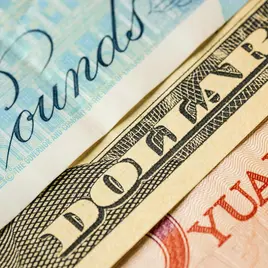
Payments
Managing Foreign Exchange (FX) Complexities in International M&A Transactions

Shareholder Representation
Common Myths About Hiring a Professional Shareholder Representative

Shareholder Representation
Keeping Investment Funds Out of Litigation Purgatory With a Professional Shareholder Representative

Shareholder Representation
Guidance on Shareholder Rep Expense Fund - Why a Properly Sized Expense Fund Can Be Good for M&A Buyers and Sellers

Shareholder Representation
How Private Equity Manages the Post-Closing M&A Process

Shareholder Representation
Effective M&A Dispute Resolution: Considerations in Arbitration, Litigation

Deal Terms Analysis
2020 Buy-Side Reps and Warranties Insurance Deal Terms Update

Shareholder Representation
COVID-19 M&A Post-Closing Scenarios
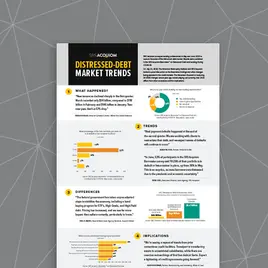
Loan Agency
Distressed-Debt Market Trends
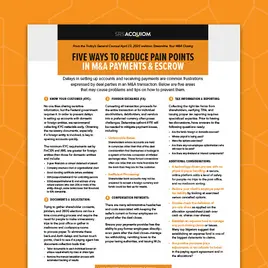
Indemnification
Payments
M&A Payments & Escrow: Five Ways to Reduce Pain Points

Payments
The High Cost for M&A Deal Parties with Foreign Exchange

Life Sciences
How COVID-19 is Impacting Life Sciences M&A Post-Close

Shareholder Representation
Strategies for Addressing Pre-Closing Sales & Use Tax Liabilities

Shareholder Representation
Managing M&A Earnouts in a Pandemic

Deal Terms Analysis
A First Look at the Impacts of Coronavirus on M&A Transactions

Indemnification
Will COVID-19 Affect Your Ability to Secure RWI Indemnification?
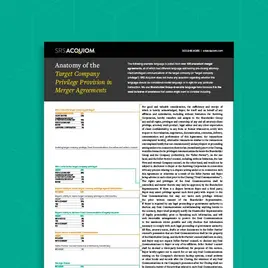
Tools for Practitioners
Shareholder Representation
Anatomy of the Target Company Privilege Provision in M&A Agreements

Shareholder Representation
5 Reasons a Selling Shareholder Should Not Volunteer to Be the Shareholder Rep
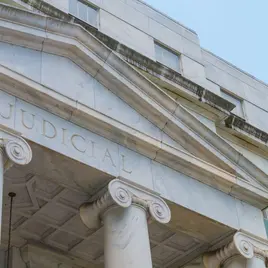
Indemnification
Payments
M&A Deals: How LOTs Have Changed (or Not) Five Years After Cigna v. Audax
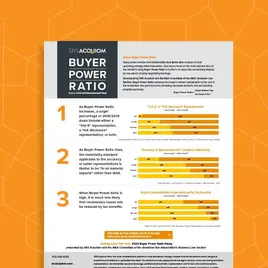
Tools for Practitioners
Shareholder Representation
Buyer Power Ratio
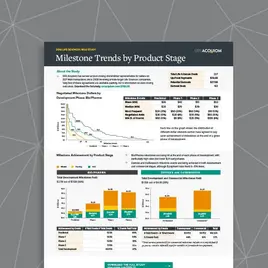
Deal Terms Analysis
Life Sciences
Life Sciences: Milestone Trends by Product Stage
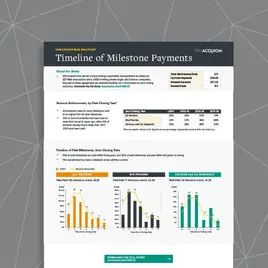
Deal Terms Analysis
Life Sciences
Life Sciences: Timeline of Milestone Payments

Deal Terms Analysis
Shareholder Representation
Addressing Target Company Privilege in Merger Agreements Five Years after Great Hill v. SIG

Loan Agency
The End of LIBOR - How to Prepare

Shareholder Representation
Tools for Practitioners
Working Capital Adjustment M&A Checklist and Guidelines

Indemnification
Reps & Warranties Insurance (RWI): Is It Changing the (M&A) World?

Deal Terms Analysis
Shareholder Representation
Beware of Exclusions When Defining Net Working Capital in M&A Transactions

Payments
Taxation of Interest Earned on the M&A Escrow Account: Actual vs. Imputed
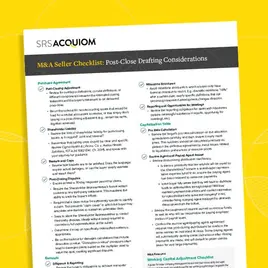
Tools for Practitioners
Shareholder Representation
M&A Seller Checklist: Post-Close Drafting Considerations

Indemnification
What's Best for Your Deal? Escrow vs Reps & Warranties Insurance
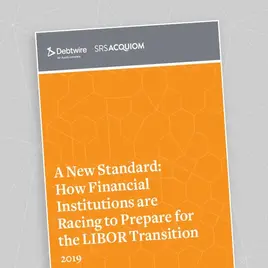
Loan Agency
A New Standard: How Financial Institutions are Racing to Prepare for the LIBOR Transition

Shareholder Representation
Five Common Reasons for Disputes in Working Capital

Loan Agency
LIBOR to SOFR in the Syndicated Loan Market
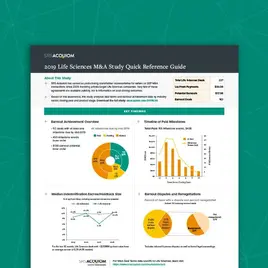
Deal Terms Analysis
Life Sciences
2019 Life Sciences Study Quick Reference Guide

Loan Agency
Loan Agency Services - The Value of the Administrative Agent (Timeliness, Trades, and Taxes)

Indemnification
M&A Escrow Agreement: Key Considerations When Negotiating

Deal Terms Analysis
Life Sciences
2019 Life Sciences M&A Study

Indemnification
Reps & Warranties Insurance (RWI) Fast Facts

Shareholder Representation
Indemnification
The Impact of Buy-Side RWI on Buyer Indemnification Efforts

Indemnification
The Rise of Representations and Warranties Insurance

Shareholder Representation
Watch Out for Legal Issues in Purchase Price Adjustments

Tools for Practitioners
Indemnification
Shareholder Representation
Tales from the M&A Trenches, 5th edition

Payments
Paying Agent Agreement - Five Important Considerations When Negotiating

Shareholder Representation
Indemnification
Purchase Price Adjustments in Light of Chicago Bridge and Rep and Warranty Insurance

Shareholder Representation
M&A Privilege: What to Make of the Great Hill Case— Who Owns the Attorney-Client Privilege After Closing and How Can it Really be Addressed?

Shareholder Representation
Does Your M&A Client Need a Professional Shareholder Rep?

Shareholder Representation
Does Your M&A Deal Need a Professional Shareholder Rep?

Shareholder Representation
Purchase Price Adjustments: Setting the Net Working Capital Target

Indemnification
Indemnification Solutions Come of Age

Shareholder Representation
Professional Shareholder Representation–A Must for Sellers

Indemnification
Concern Over New Rules Requiring Disclosure of Personal Information
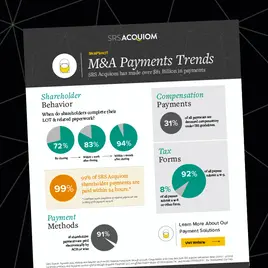
Payments
M&A Payments Trends

Payments
How to Handle Compensatory Payments Post-Closing

Deal Terms Analysis
Shareholder Representation
Understanding Changes in Shareholder Consent Requirements

Indemnification
Shareholder Representation
Payments
Unexpected Drains on Private Equity Productivity

Shareholder Representation
Mind the Gap: The Space Between a Post-Closing PPA and R&W Insurance

Indemnification
Escrows vs. Representations and Warranties Insurance (RWI M&A)

Shareholder Representation
Indemnification Claim or Working Capital Adjustment? OSI Systems v. Instrumentarium
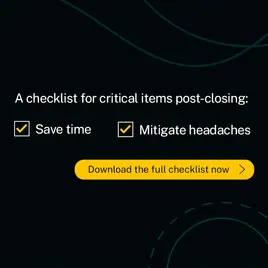
Tools for Practitioners
Shareholder Representation
Pre-Closing Checklist for M&A Seller Management

Shareholder Representation
Understanding the Role of the Purchaser Representative in Stock-for-Stock Transactions

Shareholder Representation
Selling Residual Interest to Write Off Investment Losses

Shareholder Representation
Sales Taxes: Whose Tax is it, Anyway?

Shareholder Representation
Payments
Shareholder Releases and Letters of Transmittal

Indemnification
Distribution of Escrow Release Payments

Payments
M&A: Tax Reporting and Payments to Employees

Indemnification
Perfected Security Interest in Escrow Funds

Payments
Cross-Border Transactions; Watch Out for FBAR

Indemnification
Indemnification Escrow: Who Should Indemnify the Escrow Bank?

Payments
M&A Paying Agent - How Best to Effect Payments

Indemnification
Insurance-backed M&A Escrow Solutions vs. Traditional Bank Products

Indemnification
Shareholder Representation
Avoiding Improper Lock-up of Escrow Money

Shareholder Representation
Working Capital Definition

Deal Terms Analysis
Shareholder Representation
Clarifying When Attorneys’ Fees Constitute Damages

Shareholder Representation
Preparing and Filing Tax Returns

Deal Terms Analysis
Shareholder Representation
M&A Conflict Waivers

Payments
Legal Opinion Paves Way for Paperless Closings & Online Payments

Shareholder Representation
Payments
Disbursement of Funds—Who Touches the Money?

Shareholder Representation
Enforceability of Representation and Warranty Survival Periods—Western Filter v. Argan

Shareholder Representation
Assuming Defense of Third-Party Claims: the Moral Indemnity Hazard Problem

Deal Terms Analysis
Shareholder Representation
Do Carveouts to Caps Work the Way You Intend?

Shareholder Representation
Damages Based on Financial Misstatements

Deal Terms Analysis
Shareholder Representation
Definition of Purchase Price






